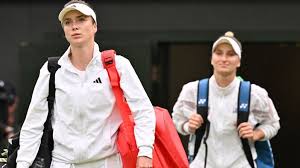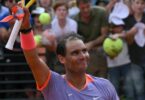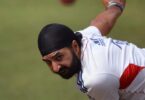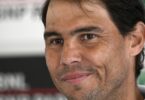Wimbledon (BBC): As the crowd cheered Elina Svitolina on to Centre Court for her Wimbledon semi-final, millions of people back in her native Ukraine tuned in to support. They have been a constant. Sheltering from Russian shells in bomb shelters and underground stations, they have still found a screen to watch.
And as Ukraine supports Svitolina, so Svitolina supports Ukraine.
Just months before her run to the last four at the All England Club in July 2023, Svitolina had been in her home country, seeing the damage of the invasion first hand. She was back again in November. Each time, she is struck by “the horror and the consequences” of the Russian invasion., external “It was a mixture of feelings for sure,” she tells BBC Sport of her trips home. “It is amazing to be back, but also a bit scary because the big cities are under air raid alert all the time.
“But what surprised me was the spirit of the people. The unbreakable spirit that they built over the two years of the war is amazing.” Some of that spirit, born of conflict, travelled with Svitolina into the rarefied surroundings of the All England Club.
As her Wimbledon semi-final against Marketa Vondrousova went on, as she faced big points, Svitolina thought back to the people she had met at home. “Those brave soldiers that are defending our country,” she says. “I think about those people, how they feel when they are there facing really dangerous moments. And there’s me in the perfect conditions in Centre Court at Wimbledon, just playing tennis. Earlier in the tournament, Svitolina had beaten Belarus’ Victoria Azarenka.
Belarus has hosted Russian troops, allowing their allies to launch the invasion across another front, close to Kyiv. Svitolina, like all Ukrainian players, has vowed not to shake hands with either Russian or Belarusian opponents until peace is restored and Ukrainian territory is returned.
At Wimbledon, Azarenka, who has condemned the violence against Ukraine,, external was booed by a Court One crowd, who assumed she was being unsporting. A month before Svitolina herself had been jeered by fans at the French Open after she refused to shake the hand of another Belarusian – Aryna Sabalenka – following a defeat.
It has been a controversial and, for some, confusing stance, but Svitolina stands by it. “Everyone should fight on their own front,” she says. “Of course the main front is our soldiers, and we try to support them with everything that we’ve got… with money… trying to help them to fight the enemy. “Also it is important to help them not lose their spirit.
They still follow the sport, they read the news. For us, it’s our united decision to fight this war.”
Svitolina is from the southern port of Odesa. And in recent months, the city has been heavily targeted.
“Yeah it’s terrible. Really terrible. My uncle and his family are there. My grandmother is still there. I’m really close with her,” Svitolina says.
“It’s really tough to see the news on a daily basis. I try to speak with her and keep up her spirits. She loves to speak with us, just to be in a moment where your life is so normal. On a daily basis there are alarms, there are rockets, all of those noises surround her, so she wants to see my family and see a normal life.
“I can’t even imagine how tough mentally it can be for her.”
When she’s not catching up with friends and family at home, or playing in matches, Svitolina dedicates her time to her foundation. The Elina Svitolina foundation was set up in 2019 and supports young tennis players in her home country.
When the invasion started, the former world number three had to think about what to do for those already part of her foundation’s programme.
“After 24 February 2022, everything changed – our goals, our views. We needed to react quickly for the kids,” Svitolina says.
She helped relocate children and their families. Only the mothers and grandmothers could come with the children, with the men, who may be required on the frontline, staying behind.
“For the families, it was not easy,” she says.
“Tennis is not the first thing you think of. You think about your safety but later on, it’s also important to continue what you love, continue dreaming and doing sport.
“It changes your mindset a little bit. To not just focus on the war and seeing your parents worried and scared.”
The foundation held a tennis camp in September in Poland, visited by Svitolina.
Makar, 12, was one of the attendees. He said that he worked hard to climb the national junior rankings and secure a place at the camp.
“All tennis players my age know that only the best get there,” he says. “The opportunity to work with the best coaches, with a large team of professionals is everyone’s dream.”
Makar, the youngest participant, said the camp was the best 10 days he’d experienced in a long time.
“Elina’s arrival was a surprise for us. I dreamed of meeting her. She was present at training and even praised me and gave me a gift on the court. She is not only a great tennis player, but also a person with a big heart,” he adds.







